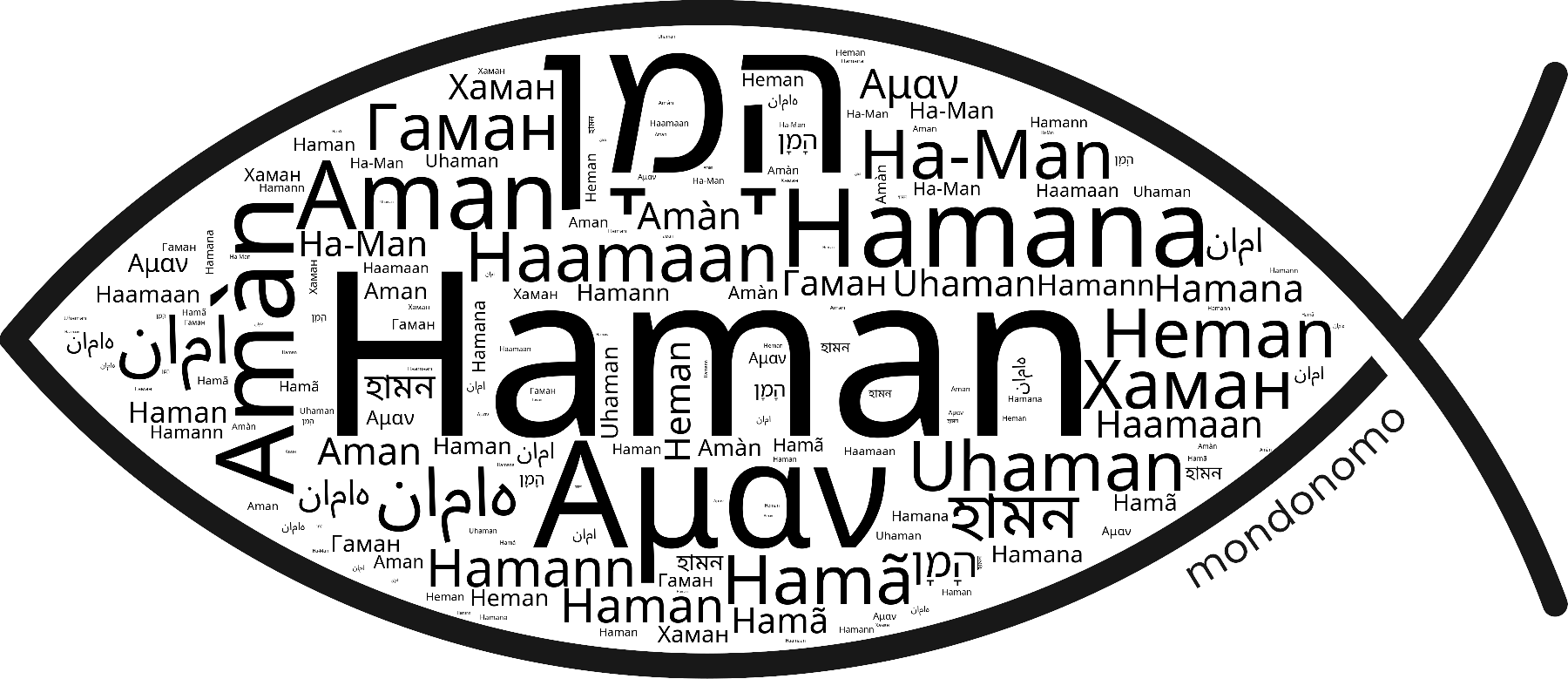First name Haman in the world's Bibles
In the bible, Haman is the name of the son of Hammedatha the Agagite (EST 3:1). Meaning of the name: noise; tumult. Related names are: Mordecai, Esther, Ahasuerus . The translations of Haman in 27 languages of the Bible are illustrated in the
ichthys
below, from Hamann in Spanish to امان in Arabic!
After these things did king Ahasuerus promote Haman the son of Hammedatha the Agagite, and advanced him, and set his seat above all the princes that were with him. (EST 3:1)
And all the king's servants, that were in the king's gate, bowed, and reverenced Haman: for the king had so commanded concerning him. But Mordecai bowed not, nor did him reverence. (EST 3:2)
Now it came to pass, when they spake daily unto him, and he hearkened not unto them, that they told Haman, to see whether Mordecai's matters would stand: for he had told them that he was a Jew. (EST 3:4)
And when Haman saw that Mordecai bowed not, nor did him reverence, then was Haman full of wrath. (EST 3:5)
And when Haman saw that Mordecai bowed not, nor did him reverence, then was Haman full of wrath. (EST 3:5)
And he thought scorn to lay hands on Mordecai alone; for they had shewed him the people of Mordecai: wherefore Haman sought to destroy all the Jews that were throughout the whole kingdom of Ahasuerus, even the people of Mordecai. (EST 3:6)
In the first month, that is, the month Nisan, in the twelfth year of king Ahasuerus, they cast Pur, that is, the lot, before Haman from day to day, and from month to month, to the twelfth month, that is, the month Adar. (EST 3:7)
And Haman said unto king Ahasuerus, There is a certain people scattered abroad and dispersed among the people in all the provinces of thy kingdom; and their laws are diverse from all people; neither keep they the king's laws: therefore it is not for the king's profit to suffer them. (EST 3:8)
And the king took his ring from his hand, and gave it unto Haman the son of Hammedatha the Agagite, the Jews' enemy. (EST 3:10)
And the king said unto Haman, The silver is given to thee, the people also, to do with them as it seemeth good to thee. (EST 3:11)
Then were the king's scribes called on the thirteenth day of the first month, and there was written according to all that Haman had commanded unto the king's lieutenants, and to the governors that were over every province, and to the rulers of every people of every province according to the writing thereof, and to every people after their language; in the name of king Ahasuerus was it written, and sealed with the king's ring. (EST 3:12)
The posts went out, being hastened by the king's commandment, and the decree was given in Shushan the palace. And the king and Haman sat down to drink; but the city Shushan was perplexed. (EST 3:15)
And Mordecai told him of all that had happened unto him, and of the sum of the money that Haman had promised to pay to the king's treasuries for the Jews, to destroy them. (EST 4:7)
And Esther answered, If it seem good unto the king, let the king and Haman come this day unto the banquet that I have prepared for him. (EST 5:4)
Then the king said, Cause Haman to make haste, that he may do as Esther hath said. So the king and Haman came to the banquet that Esther had prepared. (EST 5:5)
Then the king said, Cause Haman to make haste, that he may do as Esther hath said. So the king and Haman came to the banquet that Esther had prepared. (EST 5:5)
If I have found favour in the sight of the king, and if it please the king to grant my petition, and to perform my request, let the king and Haman come to the banquet that I shall prepare for them, and I will do tomorrow as the king hath said. (EST 5:8)
Then went Haman forth that day joyful and with a glad heart: but when Haman saw Mordecai in the king's gate, that he stood not up, nor moved for him, he was full of indignation against Mordecai. (EST 5:9)
Then went Haman forth that day joyful and with a glad heart: but when Haman saw Mordecai in the king's gate, that he stood not up, nor moved for him, he was full of indignation against Mordecai. (EST 5:9)
Nevertheless Haman refrained himself: and when he came home, he sent and called for his friends, and Zeresh his wife. (EST 5:10)
And Haman told them of the glory of his riches, and the multitude of his children, and all the things wherein the king had promoted him, and how he had advanced him above the princes and servants of the king. (EST 5:11)
Haman said moreover, Yea, Esther the queen did let no man come in with the king unto the banquet that she had prepared but myself; and to morrow am I invited unto her also with the king. (EST 5:12)
Then said Zeresh his wife and all his friends unto him, Let a gallows be made of fifty cubits high, and tomorrow speak thou unto the king that Mordecai may be hanged thereon: then go thou in merrily with the king unto the banquet. And the thing pleased Haman; and he caused the gallows to be made. (EST 5:14)
And the king said, Who is in the court? Now Haman was come into the outward court of the king's house, to speak unto the king to hang Mordecai on the gallows that he had prepared for him. (EST 6:4)
And the king's servants said unto him, Behold, Haman standeth in the court. And the king said, Let him come in. (EST 6:5)
So Haman came in. And the king said unto him, What shall be done unto the man whom the king delighteth to honour? Now Haman thought in his heart, To whom would the king delight to do honour more than to myself? (EST 6:6)
So Haman came in. And the king said unto him, What shall be done unto the man whom the king delighteth to honour? Now Haman thought in his heart, To whom would the king delight to do honour more than to myself? (EST 6:6)
And Haman answered the king, For the man whom the king delighteth to honour, (EST 6:7)
Then the king said to Haman, Make haste, and take the apparel and the horse, as thou hast said, and do even so to Mordecai the Jew, that sitteth at the king's gate: let nothing fail of all that thou has spoken. (EST 6:10)
Then took Haman the apparel and the horse, and arrayed Mordecai, and brought him on horseback through the street of the city, and proclaimed before him, Thus shall it be done unto the man whom the king delighteth to honour. (EST 6:11)
 Wear it!
Wear it!